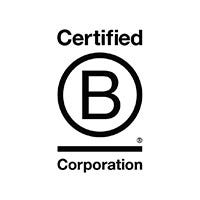
Certified B Corporations have taken a bold stance in the modern world by declaring in no uncertain terms that while they do intend to be a successful business, they will do so while also making positive changes in the world at large. This comes from an understanding that sustainability and social advocacy are actually good for business. Not only can you still turn a tidy profit when implementing an ethical business model within a company, but you can also make a positive impact on communities both local and global.
Corporations are increasingly depicted as unfeeling industrial giants whose only interest is their bottom line, but corporations that engage in conscious capitalism are far from that depiction. In reality, B Corps that embody conscious capitalism may very well change how the world views capitalism as a whole.

Certified B Corporations meet the highest standards of positive impact on society and the environment. Learn what it means to be B Corp certified.
Conscious Capitalism: Taking It Further Than CSR
Conscious capitalism is the next logical step for companies that are already engaging in CSR (corporate social responsibility), as it takes the concept of social responsibility even further. While CSR can be grafted onto traditional business models, conscious capitalism and Certified B Corporation status require that an entire business model be actively engaged in ongoing self-awareness.
With conscious capitalism, corporations go beyond what traditional CSR programs accomplish by focusing on impact maximization, incorporating a higher purpose and a caring culture in the company, and exhibiting greater citizen awareness and participation. Conscious capitalism and the B Corp movement do all of this while still serving the needs of all stakeholders within the company.
Conscious capitalism is defined by Conscious Capitalism Inc. as a “way of thinking about capitalism and business that better reflects where we are in the human journey, the state of our world today, and the innate potential of business to make a positive impact on the world.” This essentially means that while a company’s primary goal is to be profitable, there isn’t any valid reason why that company shouldn’t also strive to use their position of power and resources to improve the world as they do so.
B Corporations are almost all inherently conscious companies to begin with and the Conscious Capitalism movement has long been a partner of the B Corp movement. After all, both movements operate under the knowledge that improving the world through environmental and social advocacy is essential to continued, long-term success.
Why Conscious Capitalism Matters
First, conscious capitalism is fantastic for business. A decade-long research study conducted by Rajendra Sisdodia (one of the progenitors of conscious capitalism) showed that companies that follow the principals of conscious capitalism saw a 1,025% return on investment over the course of those 10 years. Additionally, there were more esoteric benefits such as a deeper understanding of customers, low employee turnover with high levels of engagement, and higher trust among stakeholders.
Unlike standard philanthropic efforts, conscious capitalism and CSR aim to ensure that beneficial values are part of a company’s DNA. While some companies engage in CSR to manage their corporate reputation, truly impactful businesses understand that when you implement CSR and the tenets of conscious capitalism from the get-go, reputation doesn’t need “management” as a positive reputation simply comes with the territory.
Though large corporations that have CSR programs can certainly help communities around the world, the majority of their business models are predicated on a linear economic model that still prioritizes short-term profitability. When companies become followers of conscious capitalism, the goal instead becomes to develop a circular economy that is not only beneficial economically, but environmentally and socially as well.
Making the World a Better Place For All
Many corporations currently follow a model of shareholder primacy in which maximizing the financial return for shareholders is the ultimate goal. This is a short-sighted model that can cause serious social and environmental harm as it generates economic prosperity. In order to change for the better, companies need to incorporate CSR and conscious capitalism systemically, creating a business model that takes into account how actions affect the world around them.
Companies that strongly value conscious capitalism are increasingly common in the business world, and for good reason. The current model of capitalism is becoming clearly unsustainable and as the wealth gap increases and the environment takes hit after hit, more consumers, workers, and companies recognize that something has to be done. People want a system that will not only enrich the economy but also protect the environment and improve the quality of life for people around the world.
Morally sound companies are just more attractive to both consumers and potential hires. People want to work in a diverse environment, as evidenced by the nearly 70% of those looking for jobs who say that a company’s level of diversity affects their decision of whether or not to pursue a position. The environment is even more important to millennial job-seekers, with 76% of them taking into account a company’s environmental commitments when considering applying.
Conscious capitalism and B Corps go hand-in-hand, and it is important that more potential business owners understand their importance. These ideas are not radical and many large companies put them into practice today. The future might depend on whether or not companies engage in conscious capitalism and go beyond CSR. While some are doing their part, it is of the utmost importance that these ideas be spread far and wide.
B the Change gathers and shares the voices from within the movement of people using business as a force for good and the community of Certified B Corporations. The opinions expressed do not necessarily reflect those of the nonprofit B Lab.

Conscious Capitalism: Beyond Corporate Social Responsibility? was originally published in B the Change on Medium, where people are continuing the conversation by highlighting and responding to this story.